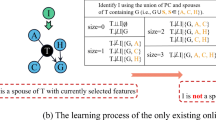Abstract
Learning of Markov blanket can be regarded as an optimal solution to the feature selection problem. In this paper, we propose a local learning algorithm, called Breadth-First search of MB (BFMB), to induce Markov blanket (MB) without having to learn a Bayesian network first. It is demonstrated as (1) easy to understand and prove to be sound in theory; (2) data efficient by making full use of the knowledge of underlying topology of MB; (3) fast by relying on fewer data passes and conditional independent test than other approaches; (4) scalable to thousands of variables due local learning. Empirical results on BFMB, along with known Iterative Association Markov blanket (IAMB) and Parents and Children based Markov boundary (PCMB), show that (i) BFMB significantly outperforms IAMB in measures of data efficiency and accuracy of discovery given the same amount of instances available (ii) BFMB inherits all the merits of PCMB, but reaches higher accuracy level using only around 20% and 60% of the number of data passes and conditional tests, respectively, used by PCMB.
Preview
Unable to display preview. Download preview PDF.
Similar content being viewed by others
References
Aliferis, C.F., Tsamardinos, I., Statnikov, A.: HITON, a Novel Markov blanket algorithm for optimal variable selection. In: Proceedings of the 2003 American Medical Informatics Association Annual Symposium, pp. 21–25 (2003)
Cheng, J., Greiner, R.: Learning Bayesian networks from data: An information-theory based approach. Artificial Intelligence 137, 43–90 (2002)
Cheng, J., Greiner, R.: Comparing Bayesian Network classifiers. In: Proceedings of the 15th Conference on UAI (1999)
Cheng, J., Bell, D.A., Liu, W.: Learning belief networks from data: An information theory based approach. In: Proceedings of the sixth ACM International Conference on Information and Knowledge Management (1997)
Cooper, G.F.: The computational complexity of probabilistic inference using Bayesian belief networks. Artificial Intelligence 42, 395–405 (1990)
Friedman, N., Geiger, D., Goldszmidt, M.: Bayesian network classifiers. Machine Learning 29, 131–163 (1997)
Herskovits, E.H.: Computer-based probabilistic-netork construction. Ph.D Thesis, Stanford University (1991)
Pena, J.M., Nilsson, R., Bjorkegren, J., Tegner, J.: Towards scalable and data efficient learning of Markov boundaries. International Journal of Approximate Reasoning 45(2), 211–232 (2007)
Koller, D., Sahami, M.: Toward optimal feature selection. In: Proceedings of International Conference on Machine Learning, pp. 284–292 (1996)
Margaritis, D., Thrun, S.: Bayesian network induction via local neighborhoods. In: Proceedings of NIPS (1999)
Pearl, J.: Probabilistic reasoning in intelligent systems: Networks of plausible inference. Morgan Kaufmann, San Francisco (1988)
Spirtes, P., Glymour, C., Scheines, R.: Causation, Prediction, and Search. Lecture Notes in Statistics. Springer, Heidelberg (1993)
Spirtes, P., Glymour, C.: An algorithm for Fast Recovery of Sparse Casual Graphs. Philosophy Methodology Logic (1990)
Tsamardinos, I., Aliferis, C.F., Statnikov, A.: Time and sample efficient discovery of Markov blankets and direct causal relations. In: Proceedings of the 9th ACM SIGKDD International Conference on Knowledge Discovery and Data Mining, pp. 673–678 (2003)
Tsamardinos, I., Aliferis, C.F.: Towards principled feature selection: Relevancy, filter and wrappers. In: AI&Stats 2003. 9th International Workshop on Artificial Intelligence and Statistics (2003)
Tsamardinos, I., Aliferis, C.F., Stantnikov, A.: Time and sample efficient discovery of Markov blankets and direct causal relations. In: Proceedings of SIGKDD 2003 (2003)
Yaramakala, S., Margaritis, D.: Speculative Markov blanket discovery for optimal feature selection. In: ICDM 2005. Proceedings of IEEE International Conference on Data Mining (2005)
Author information
Authors and Affiliations
Editor information
Rights and permissions
Copyright information
© 2007 Springer-Verlag Berlin Heidelberg
About this paper
Cite this paper
Fu, S., Desmarais, M. (2007). Local Learning Algorithm for Markov Blanket Discovery. In: Orgun, M.A., Thornton, J. (eds) AI 2007: Advances in Artificial Intelligence. AI 2007. Lecture Notes in Computer Science(), vol 4830. Springer, Berlin, Heidelberg. https://doi.org/10.1007/978-3-540-76928-6_9
Download citation
DOI: https://doi.org/10.1007/978-3-540-76928-6_9
Publisher Name: Springer, Berlin, Heidelberg
Print ISBN: 978-3-540-76926-2
Online ISBN: 978-3-540-76928-6
eBook Packages: Computer ScienceComputer Science (R0)




